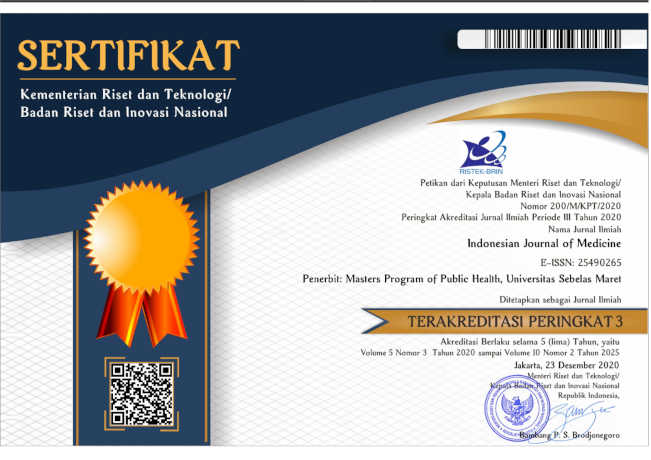The Effect of Colchicine Administration on HsCRP Level and Mean Platelet Volume in Patients with Miocard Acute Infark
DOI:
https://doi.org/10.26911/theijmed.2018.3.3.141Abstract
Background: Patients with coronary heart disease (CHD) who have received standard therapy to the fullest, are still at risk for further cardiovascular events. This is likely because the standard therapy fails to inhibit some inflammatory pathways and platelet aggregation which implies the disease. This study aimed to determine the effect of colchicine on reducing levels of high sensitive c-reactive protein (HsCRP) and mean platelet volume (MPV) in patients with Acute Myocardial Infarction (IMA) in the Intensive Cardiovascular Unit (ICVCU) Dr. Moewardi Hospital, Surakarta.
Subjects and Method: Experimental study was conducted with pre and post design. The study was conducted from November 1 to December 31, 2016. A sample of 32 patients with Acute Myocardial Infarction was divided into two groups. The control group was given a placebo and the treatment group was given colchicine 0.5 mg orally for 5 days. Statistical analysis was done using two mean different tests with dependent t-test or Mann-Whitney and two mean analysis paired using independent t-test or Wilcoxon.
Results: The HsCRP delta level in colchicine group (mean = 3.82; SD = 2.20) was higher than control group (mean = 0.57; SD = 3.12) and it was statistically significant (p<0.001). The delta MPV levels in colchicine group (mean = 2.01; SD = 1.16) were higher than control group (mean = 0.64; SD = 0.83) and it was statistically significant (p = 0.001).
Conclusion: The administration of 0.5 mg colchicine by oral for 5 days was associated with levels of HsCRP and MPV among IMA patients.
Keywords: Colchicine, HsCRP, MPV, Acute Myocardial Infarction
Correspondence: Trisulo Wasyanto. Department of Cardiology and Vascular Medicine, Faculty of Medicine, Universitas Sebelas Maret. Jl. Ir. Sutami 36A, Surakarta57126, Central Java, Indonesia. Email: trisulo.wasyanto@gmail.com
Indonesian Journal of Medicine (2018), 162-167
https://doi.org/10.26911/theijmed.2018.03.03.06
References
Badan Penelitian dan Pengembangan Kesehatan Kementerian Kesehatan RI (2013). Riset Kesehatan Dasar 2013. Jakarta: Kementerian Kesehatan RI.
Bergoli L, Castanho E, Gonçalves S, Wainstein R, Piardi G, Araújo G, et al. (2014). Mean platelet volume as a predictor of major cardiovascular out-comes and final coronary flow in patients undergoing primary percutaneous coronary intervention. Revista Brasileira de Cardiologia Invasiva, 22: 240-4.
Chu S, Becker C,Berger P, Bhatt D, Eikel-boom J, Konkle B, et al. (2010). Mean platelet volume as a predictor of cardiovascular risk: A systematic review and meta-analysis. Journal of Thrombosis and Haemostasis, 8: 148-56.
Dahlan S (2013). Besar sampel dan cara pengambilan sampel dalam penelitian kedokteran dan kesehatan, Jakarta, Salemba Medika.
Deftereos S, Giannopoulos G, Papoutsidakis N, Panagopoulou V, Kossyvakis C, Raisakis K, et al. (2013). Colchicine and the heart: Pushing the envelope. Journal of the American College of Cardiology, 62: 1817-25.
Deftereos S, Giannopoulos G,Papoutsidakis N, Bouras G, Raisakis K, Cleman W et al. (2014). Anti-inflammatory treatment with colchicine in stable chronic heart failure: A prospective, randomized study. Journal of the American College of Cardiology. 2: 131-7.
Fox A, White D, Gersh B, Jessica J, Opie H (2013). Antithrombotic agents: Platelet inhibitors, acute anticoagulants, fibrinolytics, and chronic anticoagulants. In: Opie LH. Drugs for the heart. Philadelphia: Elsevier. Seven Edition. 332-40.
Giannopoulos G, Angelidis C, Kouritas K, Dedeilias P, Filippatos G, Cleman M et al. (2015). Usefulness of colchicine to reduce perioperative myocardial damage in patients who underwent on pump coronary artery by pass grafting. The American journal of cardiology, 115: 1376-81.
Kaski JC (2010). C-reactive protein improves risk prediction in patients with acute coronary syndrome, or does it? European heart journal, 31: 290-7.
Kumar A, Cannon CP (2009). Acute coronarysyndromes: Diagnosis and management. Mayo Clinic Proceedings, 84: 917-38.
Libby P, Ridker P, Maseri A, Paul M (2002). Inflammation and atherosclerosis. Circulation, 105: 1135-43.
Loo B, Martin J (1999). A role for changes inplatelet production in the cause of acute coronary syndromes. Journal of the American College of Cardiology Arteriosclerosis, 19: 672-9.
Mann DL (2014). Colchicine and the failing heart: A “finer” anti-inflammatory agent?. Journal of the American College of Cardiology, 2: 138-40.
Mendis S, Thygesen K, Kuulasmaa K, Giampaoli S, Maho M, Blackett K, et al. (2011).World Health Organization definition of myocardial infarction: 2008–09 revision. International Jour-nal of Epidemiology, 40: 139–46.
Molad Y (2002). Update on colchicine and its mechanism of action. Current rheumatology reports. 4: 252-6.
Nidorf M, Thompson PL (2007). Effect of colchicine (0.5 mg twice daily) on high-sensitivity c-reactive protein independen of aspirin and atorvastatin in patients with stable coronary artery disease. The American journal of cardiology, 99: 805-7.
Nidorf M, Eikelboom J, Budgeon, Thomp-son P (2013). Low-dose colchicine for secondary prevention of cardiovascular disease. Journal of the American College of Cardiology. 61: 404-10.
Orn S, Manhenke C, Ueland T, Damås J, Mollnes T, Edvardsen T, et al. (2009). C-reactive protein, infarct size, micro-vascular obstruction, and left-ventricular remodelling following acute myocardial infarction. European heart journal. 30: 1180-6.
Slobodnick A, Shah B, Pillinger M, Krasnokutky S (2015). Colchicine: Old and new. The American journal of medicine, 128: 461-70.
Schjerning O, Fosbøl L, Lindhardsen J, Andersson C, Folke F, Nielsen B, et al. (2013). Cause specific cardiovascular risk associated with nonsteroidal anti-inflammatory drugs among myocardial infarction patients-a nationwide study. PloS one. 8: e54309.
Schiele F, Nicolas M, Marie F, Romain C, Vincent D, Joanna D, et al. (2009). C-reactive protein improves risk prediction in patients with acute coronary syndromes. European heart journal, 31: 290-7.
Terkeltau RA (2009). Colchicine update: 2008. Seminars in arthritis and rheumatism,38: 411-9.
Yuri G, Ayvazyan L, Dimitri P, Mikhalidis A, Kitas G (2011). Mean platelet volume: A link between thrombosis and inflammation? Current pharmaceutical design, 17: 47-58.











